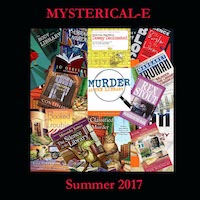Laura Elvebak sometimes feels she has led several lives, but throughout the years her passion for reading and writing never faltered. Born in North Dakota and raised in Los Angeles and San Francisco, she settled in Houston after living in parts of New York, New Jersey, Pennsylvania, and Florida. She is happily unmarried after six attempts with men who would make fascinating characters in books but didn’t succeed as husband material. She lives with her son, along with 11 cats and 1 dog. http://lauraelvebak.com
A Matter of Revenge…Amazon: https://www.amazon.com/Matter-Revenge-Laura-Elvebak/dp/1626946019/ref=sr_1_2?s=books&ie=UTF8&qid=1487532727&sr=1-2&keywords=a+matter+of+revenge
Let’s meet Laura Elvebak.
BMH: Why do you write?
LE: Because I have to. What kind of world would it be if I couldn’t write about it, explore, and search for answers?
BMH: Who do you write for?
LE: Me. When I have a plot and characters that won’t let me rest until I have written them down, I am consumed and think of little else until they are on the page.
BMH: How do you use social media to promote yourself?
LE: I have a presence on Facebook, Twitter, LinkedIn, Goodreads, Amazon Author Central.
BMH: What is something you wish someone would have told you before you became an author?
LE: I had dreams of making my living as a writer. I wish someone told me how hard it would be to live off my writing. (My dad probably hinted, but I didn’t pay attention.) There’s very little money in any form of art unless you’re among the top best sellers.
BMH: What is something you’ve never written about, but hope to some day?
LE: The story of my parents during World War II and their love affair.
BMH: How big a part did your upbringing have on your writing?
LE: My mother died of cancer when I was five. My father left to find work and a stepmother, and I was raised by my paternal grandparents until age 8. I escaped loneliness and loss by reading books and imagining stories to write and act out.
BMH: When did you know you wanted to be a writer?
LE: As a child daydreaming about a story. As a teenager, lying in bed, not able to sleep until I started a story, in full color, or continued with one from the night before. I even added previews, like the movies.
BMH: What two words best describes your writing style?
LE: Hardboiled and realistic.
BMH: Why crime fiction?
LE: Crime fiction is gritty and the closest to reality. The need to explore the motivations that lead people to commit murder and other crimes runs deep, and when there are no resolutions in real life, there is a chance in fiction to offer answers.
BMH: Have you written in other genres?
LE: I wrote and optioned a screenplay that revolved around the history of the 1900 Galveston storm and the Catholic orphanage that lost so many children in that storm.
BMH: How do you create your characters? How much of you are in your characters?
LE: Niki Alexander, in the Niki Alexander mysteries, is who I would like to be. She is passionate about saving troubled teens from danger and doing everything possible to keep them from becoming victims in the future. Other character are composites of people I know, or people I see on the street and imagine who they are in life. I write a bio for them and have them answer questions about what motivates them and what they believe about themselves.
BMH: Which is more fun to write, protagonist or antagonist?
LE: Antagonist is more fun. They are all different and surprising.
BMH: Outliner or seat-of-your-pants writer?
LE: I’m a mixture. I start out with a loose plot summary and character bios. Then I put that aside and start writing. New ideas and concepts will come along and change the initial idea. After the first 50 pages, I have to re-evaluate what’s going to happen. During the writing process, I’m listening to my characters and follow my instincts. What I imagined at first might be completely changed by the end.
BMH: Do you have a daily writing routine?
LE: I try to write every day. The best time for me is in the afternoon and continuing on until I reach a stopping point.
BMH: How do you handle research?
LE: With the Niki Alexander stories, I visited Covenant House in Houston, talked to counselors there and teenagers on the street. My own daughters used to bring home friends who needed a friend or a shelter. I enrolled in the Citizen Police Academy, a 10 week course that covered every aspect of police work and also attended the Writers Police Academy in Wisconsin. I visit most places in the books for authenticity.
BMH: How much editing do you do as you write your first draft?
LE: Extensive. I’m involved with two critique groups that meet weekly, and I bring chapters as I write them and then make edits after hearing their suggestions. I revise each chapter until I’m satisfied.
BMH: What comes first for you, characters or plot?
LE: Characters. People are so fascinating, they have to belong in a book. Their experiences and background will choose the direction and the purpose of the story.
BMH: You can go back in time, meet and chat with anyone, who would it be? What would you talk about?
LE: Mark Twain. A fascinating character himself. We would talk philosophy and the meaning of life.
BMH: How about some hard-earned advice.
LE: If you have a dream of writing, if that is your passion, don’t let anyone talk you out of it. Don’t let rejection discourage you. Don’t give up. If you do, you’ll regret it forever.




Great interview, Laura. I’m with you on characters coming first before plotting. For me, characters drive the story. When I finish a book, I remember the characters more than the story.
Me, too, Kathleen. Thank you for responding.